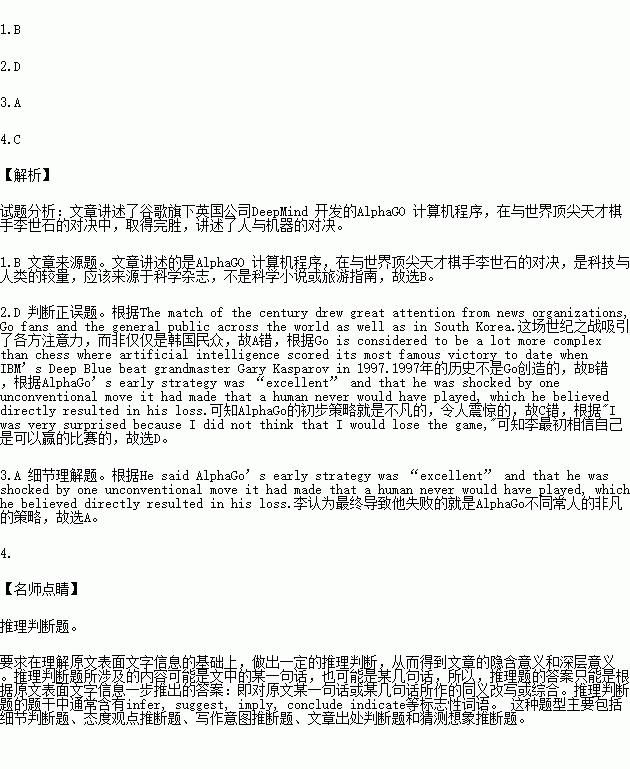题目内容
Go, known as Weiqi in China and Baduk in South Korea, was viewed as the last game where humans can defeat machines. Lee Se-dol, one of the greatest Go players, has won 18 world championships for 21 years of his professional career. AlphaGo, a computer program developed by Google's DeepMind, beat the European Go champion, an achievement that was not expected for years in October, 2015.
The match between Lee and AlphaGo was seen as a representative game between humans and Artificial Intelligence (AI). The match of the century drew great attention from news organizations, Go fans and the general public across the world as well as in South Korea.
Go originated from China more than 2,500 years ago. It involves two players who take turns putting markers on a net-shaped board to gain more areas on it. One can occupy the markers of the rival (对手) by surrounding the pieces of the other. Go is considered to be a lot more complex than chess where artificial intelligence scored its most famous victory to date when IBM’s Deep Blue beat grandmaster Gary Kasparov in 1997.
But experts say Go presents an entirely different challenge because of the game’s incomputable number of move options. In other words, the computer must be capable of human-like "intuition" (直觉) to win.
"I was very surprised because I did not think that I would lose the game," said Mr. Lee. He said AlphaGo’s early strategy was “excellent” and that he was shocked by one unconventional move it had made that a human never would have played, which he believed directly resulted in his loss.
AlphaGo is proud of a deep learning capability to learn for itself and discover new strategies by playing games against itself and adjusting neural networks (神经网络) based on a trial-and-error process known as reinforcement (强化) learning.
In spite of his loss, he did not regret accepting the challenge. "I had a lot of fun playing Go and I’m looking forward to the future games,” he said after AlphaGo won 3-0 in a five-game match.
“Playing against a machine is very different from an actual human player. Normally, you can sense your rival’s breathing, their energy. And lots of times you make decisions which depend on the physical reactions of the person you’re playing against. With a machine, you can’t do that”, Lee said.
1. Where can we most probably read this text?
A. In a personal diary
B. In a science magazine
C. In a science fiction
D. In a travel guide
2. Which of the following is TRUE?
A. Only people in South Korea pay attention to the match between Lee and AlphaGo.
B. Artificial intelligence rewrote the history as AlphaGo beat Gary Kasparov in 1997.
C. AlphaGo’s early strategy was to play by regular moves the same as human beings.
D. Lee Se-dol was convinced he would finally win the match before the series started.
3.What did Lee think was the cause of his loss?
A. AlphaGo had an excellent strategy and unconventional moves.
B. He couldn’t sense AlphaGo’s breathing and energy in the games.
C. He made decisions depending on the rival’s physical reactions.
D. The designer of AlphaGo was a talent who couldn’t be defeated.
4.This article is mainly about _____.
A. The differences between playing chess and Go
B. The difficulties Lee met in the match with AlphaGo
C. The introduction of a match between Lee and AlphaGo
D. The development of the Artificial Intelligence (AI)
 阅读快车系列答案
阅读快车系列答案
